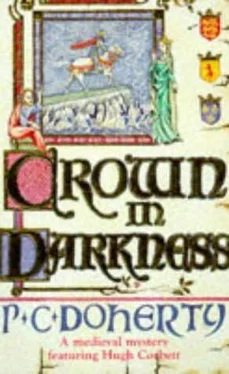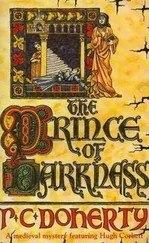Paul Doherty - Crown in Darkness
Здесь есть возможность читать онлайн «Paul Doherty - Crown in Darkness» весь текст электронной книги совершенно бесплатно (целиком полную версию без сокращений). В некоторых случаях можно слушать аудио, скачать через торрент в формате fb2 и присутствует краткое содержание. Жанр: Исторический детектив, на английском языке. Описание произведения, (предисловие) а так же отзывы посетителей доступны на портале библиотеки ЛибКат.
- Название:Crown in Darkness
- Автор:
- Жанр:
- Год:неизвестен
- ISBN:нет данных
- Рейтинг книги:4 / 5. Голосов: 1
-
Избранное:Добавить в избранное
- Отзывы:
-
Ваша оценка:
- 80
- 1
- 2
- 3
- 4
- 5
Crown in Darkness: краткое содержание, описание и аннотация
Предлагаем к чтению аннотацию, описание, краткое содержание или предисловие (зависит от того, что написал сам автор книги «Crown in Darkness»). Если вы не нашли необходимую информацию о книге — напишите в комментариях, мы постараемся отыскать её.
Crown in Darkness — читать онлайн бесплатно полную книгу (весь текст) целиком
Ниже представлен текст книги, разбитый по страницам. Система сохранения места последней прочитанной страницы, позволяет с удобством читать онлайн бесплатно книгу «Crown in Darkness», без необходимости каждый раз заново искать на чём Вы остановились. Поставьте закладку, и сможете в любой момент перейти на страницу, на которой закончили чтение.
Интервал:
Закладка:
Corbett was tactful enough never to draw comparisons or appear to criticise. Privately, he was more than aware of the deep differences between the two countries. There was more wealth in England and so greater sophistication, whether it be in the use and treatment of parchment or the building of castles and churches. He remembered the soaring purity of Westminster Abbey with its pointed arches, trellised stonework, large windows and coloured glass and realised the contrast as he looked at the primitive rather dark simplicity of the Abbey of Holy Rood with its stout round columns, small, deep splayed windows and dog-tooth stone carving above a simple square nave and chancel. Nevertheless, there was an energy and openness about the monks which cut through Corbett's jaded outlook and soft sophistication. Moreover, the monks like those in England, loved to talk, chatter and discuss. The Abbey kept its own chronicle and it was easy for Corbett to turn the conversation to the recent happenings in Scotland and so glean useful information, even though it was based on the gossip of a monastic library. The monks informed him about the court, the current scandals and, more especially, that the young French princess, widow of Alexander III, was still residing at Kinghorn Manor. Corbett decided to visit her and the Prior offered a guide. Corbett gratefully declined this though he did accept a thick serge cloak with a capuchon or hood for, though it was May, the weather was still cold and, wrapped in this, Corbett left the monastery on the most docile cob he had ever ridden. The clerk used a crudely-drawn map sketched out by one of the monks to guide his horse from the craggy plateau of Edinburgh down onto the road to the ferry at Dalmeny. The same route, Corbett reflected, Alexander had taken that fateful night some two months earlier. Now, the weather was calmer; a clear jewel-blue sky across which puffs of white clouds were sent scudding by a stiff breeze. In the distance, Corbett saw the glint of sunlight on the waters of the Forth and, around him, a late spring was making itself felt in the clumps of wild white flowers, soft green grass and the constant chatter of song-birds.
Corbett turned his long, tired face to the sky and for a moment understood the sheer joy and beauty of Francis of Assisi's "Canticle to the Sun". Then he came to where the rutted track he was following crossed another and saw the three branched gallows, each with its blackening, bird-pecked burden. His mood swung in violent contrast and Corbett felt despair, a terrifying sense of the world's sin, a deep malevolence in the affairs of men. "And the serpent entered Eden" Corbett muttered to himself and goaded his horse over the track, across the flimsiest of bridges and up into the village of Dalmeny. It was really more of a hamlet, a collection of long houses built with timber, wattle and daub on cobbled footings while thatched roofs covered both living-quarters and byre. These were scattered round a large green where gaunt cattle cropped hungrily at the sparse spring grass. Half-naked babies played in the dust, watched over by a group of red-haired, green-eyed women. They simply stared at Corbett before continuing their conversations in a fast, guttural dialect. Corbett passed on, down a steep hill which gave him a splendid view of the Forth and the small ferry-port below him. The monks had described the route carefully, adding that the ferry-port was often called
Queen's Ferry, being the route used by Saint Margaret, the English Queen of the great King Malcolm Conmore, whenever she crossed the Forth.
The cob gingerly picked its way down along the loose shale track and approached the thatched, wattle-daubed long hut which stood near a crudely-built jetty. The ferrymaster was waiting for custom; a big, bald, brawny fellow with a weather-beaten face and a perpetual toothless smile. He was a sailor who understood English and promptly agreed to ferry Corbett across the Forth, adding a few coins to the price for looking after his horse and saddle. Soon, they were making their way across the water; Corbett sat in the stern while the fellow heaved and panted as he worked the oars. Corbett nonchalantly asked if he had taken the late King across; the ferryman nodded, turned and spat into the water. 'Could you tell me what happened?' Corbett asked. His companion grunted, turned and spat again, so Corbett laid a gold piece on the board before him and the man grinned. 'It was a raw night,' he said, relaxing the oars and letting the skiff dance on the gentle swell. 'A strong easterly wind had been raging for days, driving the water up the Forth. I was in my house, tucked in with my woman when there came a pounding on the door. I saw from the window that it was two squires, wearing the royal livery, wet and bedraggled, who bawled that His Grace, the King of Scotland, demanded passage. I opened the door and they entered. The King behind them. I knew it was he, large-framed, red-haired, with the eyes and nose of an eagle. I had seen him many times cross the Forth.' The ferryman stopped, smiled slyly and went to pick up the coin, so Corbett drew the long dagger from beneath his cloak. The ferryman shrugged, laughed and continued. 'I went down on my knees but the King bellowed at me to get up and prepare my skiff. I tried to reason with him but the King asked if I was afraid of dying. I replied I was, though more than prepared to die with him.' 'What did the King do?' Corbett asked. The ferryman grimaced. 'Roared with laughter and tossed me a purse of coins. So I got the skiff ready.' 'Was the King drunk?' Corbett asked quietly. 'No,' the fellow replied. 'He had been drinking deep but he was not in his cups.' 'Then what?' 'I took him and his two squires across. Landed them, waited till morning and then returned.' 'Why wait till morning?' Corbett asked. 'Because of the storm,' the ferryman replied caustically. 'One ferryman died that night, Simon Taggart,' he pointed back to the shore we had left. 'His body was found in the shallows. Quite drowned. His widow says that he, too, tried to cross the Forth that night but died.' He turned and spat over the side. 'Poor bastard! He should have known better!' 'So, someone else crossed that night?' Corbett asked. The ferryman shrugged. 'Not necessarily, Simon could have been trying to transport goods. Anyway, many people die in the Forth.' 'When you got over,' Corbett insisted. 'Did you see or hear anything untoward?' 'Like what?' the ferryman snapped back. 'Why, should there have been? No,' he continued, 'as soon as we entered the shallows, the King, followed by his squires, jumped out and waded ashore. There was someone waiting. I heard voices, the neighing and movement of horses. Then he was gone. When I beached the boat there was only the royal purveyor standing, soaking wet on the beach, loudly cursing the King's mad escapades.' 'Then what?' Corbett interrupted again. 'Then nothing,' the ferryman replied. 'The purveyor disappeared into the darkness, I made my boat secure and went to sleep in a hut.' 'That is all?' 'That is all,' he replied firmly and, grabbing the oars, began to pull for the distant shore.
Corbett just slumped in the stern, trying to ignore the rocking of the boat by concentrating on what he had just learnt. Eventually they beached, and the ferrymaster told Corbett where to hire a horse in the nearby village of Inverkeithing. An expensive business, for it was really a rough-hooved garron no bigger than a mule and Corbett felt ridiculous riding it with his feet a few inches from the ground. Nevertheless, the animal was sure-footed. A great advantage as Corbett began to climb up the cliffs which swooped above him. When Corbett reached the clifftop path, he looked round and realised why Alexander had taken that route; with the sea on his right the King had a sure guide along the coast, much preferable to moving inland and be lost in the wild moorlands which stretched from the cliff tops to the far horizon. Quite an easy matter on a dark, storm-ridden night. Corbett looked up at the sky, guessed it must now be afternoon, and let his cob pick its way along while he made sure he kept well away from the cliff edge. He passed the village of Aberdour, where the cliff edge began to climb and Corbett realised he was approaching Kinghorn Ness, the scene of King Alexander's death. It was warm now but, as Corbett felt the strong wind on his face and heard the sea pounding below him, he wondered what would bring any sane man along such a dangerous route at the dead of night and in the teeth of a furious storm.
Читать дальшеИнтервал:
Закладка:
Похожие книги на «Crown in Darkness»
Представляем Вашему вниманию похожие книги на «Crown in Darkness» списком для выбора. Мы отобрали схожую по названию и смыслу литературу в надежде предоставить читателям больше вариантов отыскать новые, интересные, ещё непрочитанные произведения.
Обсуждение, отзывы о книге «Crown in Darkness» и просто собственные мнения читателей. Оставьте ваши комментарии, напишите, что Вы думаете о произведении, его смысле или главных героях. Укажите что конкретно понравилось, а что нет, и почему Вы так считаете.












